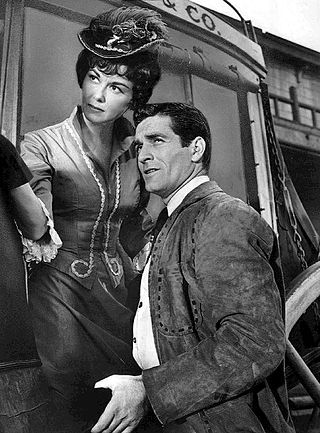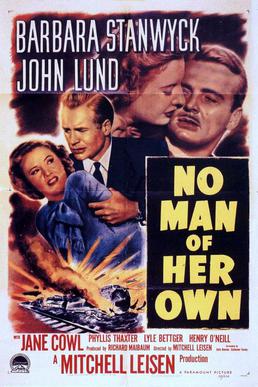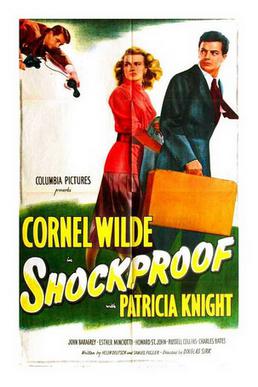
Dead Man is a 1995 American acid western film written and directed by Jim Jarmusch. It stars Johnny Depp, Gary Farmer, Billy Bob Thornton, Iggy Pop, Crispin Glover, John Hurt, Michael Wincott, Lance Henriksen, Gabriel Byrne, Mili Avital, and Robert Mitchum in his final film performance. The movie, set in the late 1800s, follows William Blake, a meek accountant on the run after murdering a man. He has a chance encounter with enigmatic Native American spirit-guide "Nobody", who believes Blake is the reincarnation of the visionary English poet William Blake.

Gunfight at the O.K. Corral is a 1957 American Western film starring Burt Lancaster as Wyatt Earp and Kirk Douglas as Doc Holliday, and loosely based on the actual event in 1881. The film was directed by John Sturges from a screenplay written by novelist Leon Uris. It was a remake of the 1939 film Frontier Marshall starring Randolph Scott, which was until 1957 the definitive film of the gunfight story.

Jewel Franklin Guy, known professionally as James Best, was an American television, film, stage, and voice actor, as well as a writer, director, acting coach, artist, college professor, and musician. During a career that spanned more than 60 years, he performed not only in feature films but also in scores of television series, as well as appearing on various country music programs and talk shows. Television audiences, however, perhaps most closely associate Best with his role as the bumbling Sheriff Rosco P. Coltrane in the action-comedy series The Dukes of Hazzard, which originally aired on CBS between 1979 and 1985. He reprised the role in 1997 and 2000 for the made-for-television movies The Dukes of Hazzard: Reunion! and The Dukes of Hazzard: Hazzard in Hollywood (2000).

The Life and Legend of Wyatt Earp is the first Western television series written for adults. It premiered four days before Gunsmoke on September 6, 1955. Two weeks later came the Clint Walker western Cheyenne. The series is loosely based on the life of frontier marshal Wyatt Earp. The half-hour, black-and-white program aired for six seasons on ABC from 1955 to 1961, with Hugh O'Brian in the title role.

Patrick Barry Sullivan was an American actor of film, television, theatre, and radio. In a career that spanned over 40 years, Sullivan appeared in over 100 movies from the 1930s to the 1980s, primarily as a leading actor after establishing himself in the industry, and later as a character actor.

Harold J. Stone was an American stage, radio, film, and television character actor.

3:10 to Yuma is a 1957 American Western film directed by Delmer Daves, starring Glenn Ford and Van Heflin. Based on a 1953 short story by Elmore Leonard, it is about a drought-impoverished rancher who takes on the risky job of escorting a notorious outlaw to justice.

Don "Red" Barry, also known as Red Barry was an American film and television actor. He was nicknamed "Red" after appearing as the first Red Ryder in the highly successful 1940 film Adventures of Red Ryder with Noah Beery Sr.; the character was played in later films by "Wild Bill" Elliott and Allan Lane. Barry went on to bigger budget films following Red Ryder, but none reached his previous level of success. He played Red Doyle in the 1964 Perry Mason episode "The Case of the Simple Simon".

Man of the West is a 1958 American Western film noir film starring Gary Cooper and directed by Anthony Mann, produced by Walter Mirisch and distributed by United Artists. The screenplay, written by Reginald Rose, is based on the 1955 novel The Border Jumpers, by Will C. Brown. Julie London, Lee J. Cobb, Jack Lord, and Arthur O'Connell co-star with John Dehner, Robert J. Wilke, and Royal Dano in supporting roles. The film is one of Cooper's final Westerns.

No Man of Her Own is a 1950 American film noir drama directed by Mitchell Leisen and featuring Barbara Stanwyck, John Lund, Phyllis Thaxter, Jane Cowl and Lyle Bettger. The production is the second film Stanwyck made with director Mitchell Leisen. Its screenplay was adapted from Cornell Woolrich's 1948 novel I Married a Dead Man. Woolrich is cited in the film's opening credits by one of his commonly used pseudonyms, "William Irish".

The Magnificent Seven Ride! is a 1972 Western film and is the third and last sequel of the 1960 western, The Magnificent Seven. It stars Lee Van Cleef as Chris Adams, succeeding Yul Brynner and George Kennedy in the role. It was directed by George McCowan.

Salem's Lot is a 1979 American two-part vampire miniseries based on the 1975 horror novel 'Salem's Lot by Stephen King. Directed by Tobe Hooper and starring David Soul and James Mason, the plot concerns a writer who returns to his hometown and discovers that its citizens are turning into vampires. Salem's Lot combines elements of the vampire film and haunted house subgenres of horror.

Shockproof is a 1949 American crime film noir directed by Douglas Sirk and starring Patricia Knight and Cornel Wilde. Wilde and Knight were husband and wife during filming. They divorced in 1951.

Edward Waller was an American stage, film and television actor.

Crime of Passion is a 1957 American film noir crime drama directed by Gerd Oswald and written by Jo Eisinger. The cast features Barbara Stanwyck, Sterling Hayden and Raymond Burr.

Douglas Richards Kennedy was an American actor who appeared in more than 190 films from 1935 to 1973.
Yuma is a 1971 American Western television film directed by Ted Post and starring Clint Walker in the lead role. It was shot in Old Tucson. The film was originally a television pilot that appeared on the ABC Movie of the Week.

Law and Order is a 1953 American Western film directed by Nathan Juran and starring Ronald Reagan, Dorothy Malone and Preston Foster.

Harry Sukman was an American film and television composer.

Ziva Rodann, known first as Ziva Shapir, is an Israeli-American actress. She was a Hollywood film star and a frequent guest star on television series from the late 1950s to the late 1960s.



















